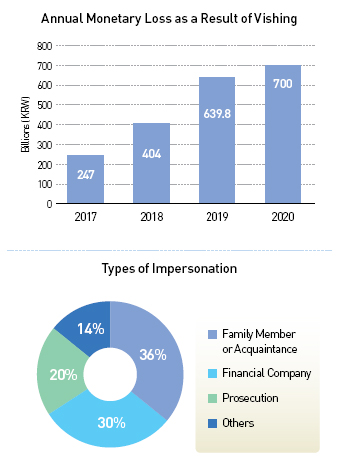Last October, the head of a vishing organization that impersonated “Team Leader Kim Mi-young” to extort tens of billions of KRW from people of South Korea for nine years was finally caught in the Philippines. The mastermind, the first-generation vishing criminal, turned out to be a former policeman. News of his arrest was a striking issue in South Korea.
Several Koreans became victims of the fraud, especially since 2006, when Team Leader Kim Mi-young commenced “her” activity. The term vishing, or phone fraud, usually called “voice phishing” in Korea, is a combination of voice, private data, and fishing. It is one of the most serious social problems as the total damage caused by vishing amounted to 700 billion KRW in 2020 according to the National Police Agency (NPA).
Voice Phishing Techniques
Voice phishing frauds have been steadily relying on various techniques to swindle people. Earlier, the most common mode used to be impersonating employees of national institutions, banks, and the prosecutor’s office, on the lines of what Team Leader Kim Mi-young did. However, nowadays, more and more swindlers are pretending to be family members of the victims to extort money. According to the Financial Supervisory Service of Korea (FSS), among 620 vishing victims from February and March 2021, 36.1 percent were swindled by frauds who impersonated their family members or acquaintances. As the chart shows, most vishing incidents have involved the impersonation of family and friends. Swindlers not only use phone calls but also text messages and mobile messenger applications these days.

FSS announced that 50 percent of respondents aged under 30 years were swindled by callers who told them that they had been implicated in a crime. Regarding the recent exposure of many people in their twenties or below to such fraud, The UOS Times interviewed two college students who had experienced it this year.

Student A
A few months ago, I got a call from the prosecutor’s office, telling me that I had been involved in a crime. The caller said that someone had hacked my bank account to use it to commit a crime. He seemed to want to secure my personal and financial information. However, I realized that it was a vishing call at once, so I could not help but laugh out loud as it was my first time encountering the phone scam. After hearing me laugh, the “prosecutor” cursed me and hung up right away. In the beginning, he talked fast, as if he was reading something or saying lines that he had memorized. Nevertheless, the last few words he mumbled were pronounced incoherently, so I could not understand what he meant, probably because he was not Korean. Now I feel upset about particular ethnic groups that rely on improper methods to extort money from innocent Koreans.

Student B
I was once impersonated by someone, and my mother got a text message from the swindler. He used a plausible phone number that began with 010, and texted my mother as if I were using someone else’s phone to reach her, claiming that my phone was broken. He asked her to send money for repairs. However, my mother found it suspicious because the text messages were not in my usual tone. She later told me that she had found a few spelling and spacing errors, as well. Thus, my mother called me for confirmation prior to making a decision. I took her call right away and assured her that both my phone and I were alright. She said that she was about to send the money. Thank God the swindler was a foreigner with poor Korean skills!
Social Effects
The two interviewees shared one thing in common: they assumed the fraudsters foreigners. This is because most of the vishing crimes are widely known to be conducted by organizations that comprise Chinese or Korean-Chinese people. As a result, racial stereotypes have intensified. A lot of Koreans have begun to believe that foreigners benefit by committing crimes in South Korea. The prejudicial view that vishing callers are men and that they all speak Korean poorly is so famous that it even became the subject matter of a Korean comedy program, a few years ago.

Chinese and Korean-Chinese Phobia, which involve discriminating against both ethnic groups, also appeared because of these views. However, the NPA of Korea revealed that 97.5 percent of the frauds arrested in 2020 were all Koreans. Thus, people need to stop looking at this crime through a racial lens as it is just a bias. They should also stop trusting people who speak standard Korean because their belief that only Chinese or Korean-Chinese people commit vishing crimes is wrong. While remaining vigilant, stereotypes around certain ethnicities must be eliminated in people’s minds.
As a result of pervasive vishing frauds who know about people very well, citizens have been feeling uncomfortable about sharing their personal information whenever they need to sign up and sign in somewhere.
As they are now aware of the dangers regarding the exposure of their personal data, many of them have lost their trust in enterprises, applications, etc. This happens a lot to victims, especially. Vishing victims suffer from various side effects. The NPA reported that it took only five years for the average amount of damage per person to triple from 8,910,000 KRW to 22,090,000 KRW. As victims lose a large amount of money at the hands of swindlers, most of them end up being encumbered by debt. However, financial problems are not the only side effect for the victims. Many of them suffer mental damage from trauma, because of the experience of being threatened by swindlers. Some even die by suicide, reproaching themselves on account of their loss of hope.
Countermeasures
What should people do when they are duped by vishing? Like in medicine, there is a “golden hour” in such cases, as well. If victims suspend their bank accounts within 30 minutes, they can protect their money safely because cash withdrawal from an Automated Teller Machine (ATM) is delayed for 30 minutes when one deposits more than 1 million KRW. However, if they realize that they have been swindled after more than 30 minutes, they have to report it to the police right away and freeze all their accounts and phones to minimize damage. It is important to give all the information they know such as the swindler’s account number to the police, as well. It is ideal to prevent this from happening altogether. Therefore, prevention education programs for financial frauds should be revitalized at schools, workplaces, organizations, and more, so that citizens regardless of age and gender can deal with the problem appropriately. People should always be cautious with their personal information so that it is not leaked to someone who may exploit it.
Conclusion
Vishing techniques have evolved over time. People should be aware of the existing criminal techniques and countermeasures against them. Suspicious phone calls and text messages from unknown people should be ignored. People must confirm if they really are talking to their family members or acquaintances when they are asked for money. Never once in their history have government agencies or banks asked for any personal information from anyone on the phone. The UOS Times hopes that its readers will bear in mind that vishing can happen to anyone so that they remain vigilant and avoid falling prey to the crime.
Lee Seo-yeon
sy001109@uos.ac.kr

